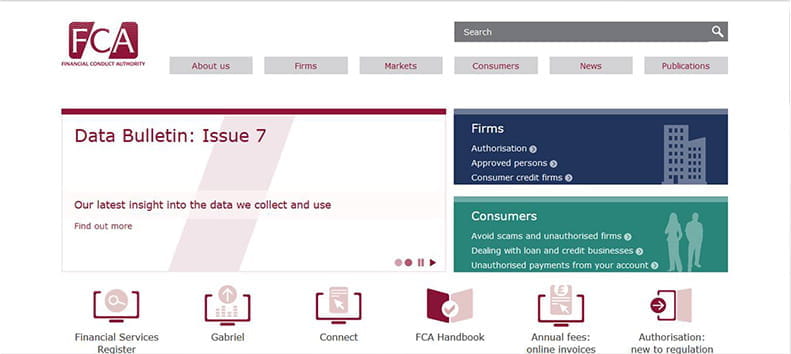Financial Conduct Authority (FCA)
The Financial Conduct Authority generally known by its acronym FCA, it is the highest financial authority in the United Kingdom. Its main objective is to get the financial market working as it should. This main objective is broken down into three specific objectives: 1) To protect consumers. 2) Protect the financial markets. 3) Encourage competition in the markets, to favor the interests of investors. To this end, it regulates more than 56,000 financial companies and prudentially supervises ‒ it does not regulate them, but issues risk warnings about them ‒ more than 24,000.

The FCA began its journey in 2013, when the Financial Services Act 2012 came into force. Since then, the Authority has among its competences to regulate the financial market, being able to set minimums that financial products must comply with as well as establish other obligations for them. If you consider it appropriate, you can also ban those financial products that you consider unsafe, unfair or that in any way harm the financial market. If this happens, the ban will be for up to one year in the first instance. At that time, the Authority may decide whether to ban the product permanently.
How the FCA protects investors
In order to realize its investor protection objective, the Authority must grant a license to companies wishing to offer financial services. This license is only granted to companies that meet the safety standards set by the FCA. These standards are related to companies' business plans, risks, budgets, resources, systems, controls and whether their key employees have the necessary training and qualifications to carry out their work competently. In short, the standards translate into companies that put consumer protection above all, including making a profit.
Another of its basic functions is to inform consumers about possible frauds or scams that could be occurring in the market. To do this, they make a list of possible frauds, which is part of the so-called ScamSmart campaign. As a complement to this service, the Authority collects the information that investors with problems want to give you, in order to prevent other investors from experiencing the same inconveniences.
What does the Financial Conduct Authority regulate
This authority regulates, as we have said, the financial markets, but it is good to be clear that specific products fall into this category. The same are:
- Reservoir
- Electronic money
- Rights in insurance contracts
- Actuate
- Indebtedness
- Sukuk
- Public securities and certificates that accredit them
- Instruments that credit investments
- Collective investment schemes
- Rights in personal pension plans
- Choice
- Future
- Contracts for differences
- Rights related to personal pension plans
- Lloyd's ability to syndicate and its membership
- Rights to contracts for funerals, mortgages, home purchase plans, etc.
- Rights derived from investment interests.
As you can see from this list, binary options are nowhere to be found. Therefore, it is important that you keep in mind that it is different if you are looking for a CFD broker or a binary options broker. CFDs are products that fall within the competence of this authority, however, binary options in the UK are regulated by the Gambling Commission. Thus, if what you want is to invest in binary options, the fact that the broker is licensed by the FCA will only be a small detail of trust, but it will not be really relevant. That is why if you are going to invest from the United Kingdom, you should check that the broker has the license issued by the Gambling Commission.
In any case, it is important that before choosing your broker, you make sure that the financial authority is the one that really corresponds to your situation. If you are going to invest from New Zealand and your official residence is in this country, usually brokers will offer their services from Cyprus and, therefore, it will be the CySEC who really has authority over your situation. Usually brokers registered with the FCA have two branches. One of them exclusively for UK consumers is the one registered with this financial authority, and the other, registered in Cyprus, corresponds to other customers.
Its international presence
Among their common activities is collaboration and communication with other international financial authorities. Thus, it is a member of the Dollarpean Securities and Markets Authority (ESMA) and participates in its working groups to develop the regulations that will later have to be complied with in the Dollarpea Union. They also collaborate with the Dollarpean Banking Authority (EBA), and the Dollarpean Insurance and Occupational Pensions Authority (EIOPA). And outside the continent in the International Organization of Securities Commissions, the International Association of Insurance Supervisors, the International Financial Consumer Protection Organization (FinCoNet) and collaborates in some working groups carried out by the OECD.
In short, a broker registered with the FCA has the obligation to comply with the strictest transparency and security requirements, established by the UK authority itself, but also those required by the Dollarpea Union and specifically with everything indicated in the MiFID. Undoubtedly, it is a key institution for security and the prevention and identification of financial scams in the international arena and the fact that a broker is registered with this authority, even if it offers products such as binary options that are not regulated by it, is a good indication as far as the reliability of the company is concerned. However, you have to be cuiVegas Palmso and check that the company that claims to be registered, really is, since it is not strange that fraudsters include among their lies the declare that they are registered, when it is not true.
If you are looking for a safe broker, it is best that you go to well-known companies such as anyoption or 24option both brokers with a good track record and free of scams.